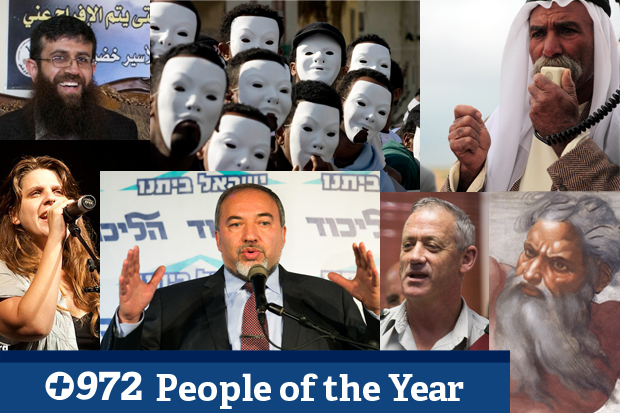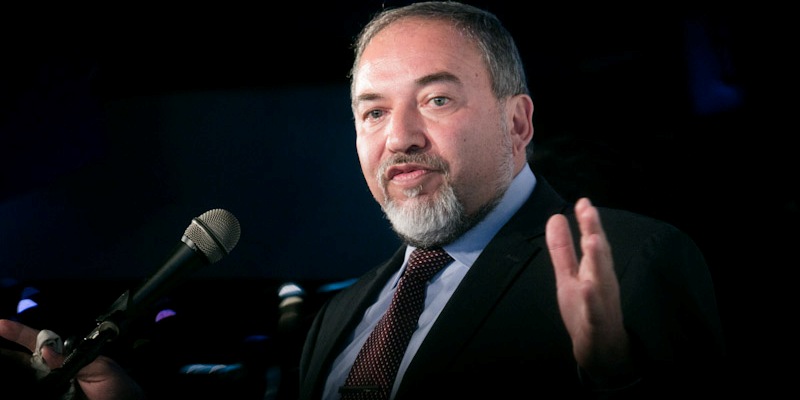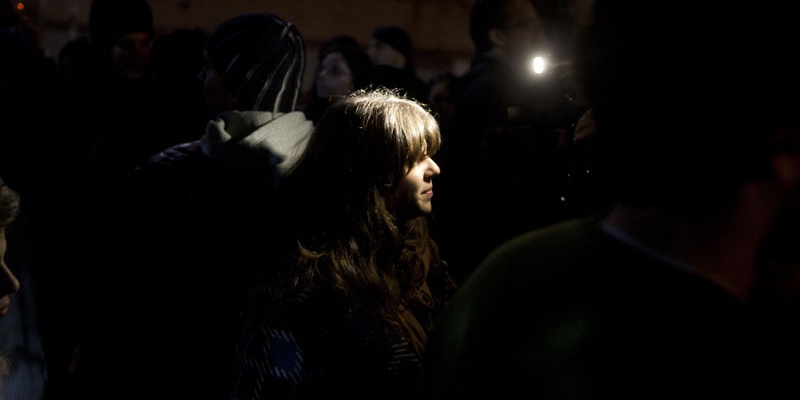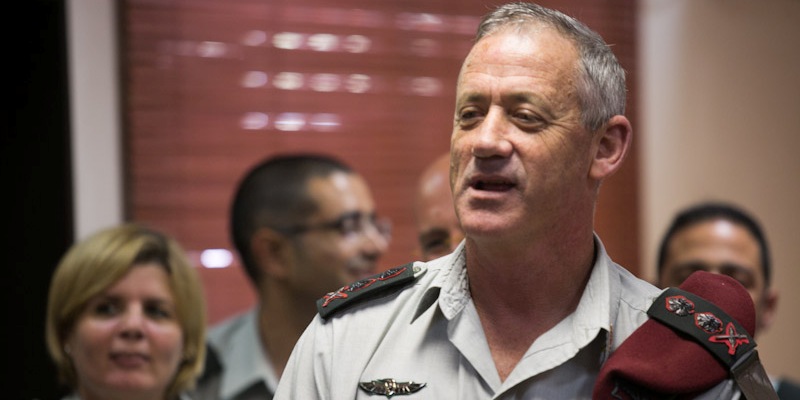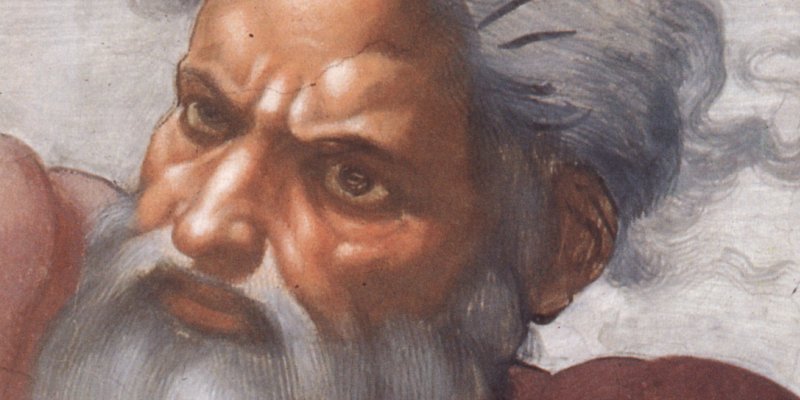Featured prominently in headlines from the region this year were hunger strikers, refugees, threats of war, actual war, demolitions and elections. +972 bloggers pick the people who, for them, defined 2012.
Khader Adnan, Palestinian prisoner and hunger striker
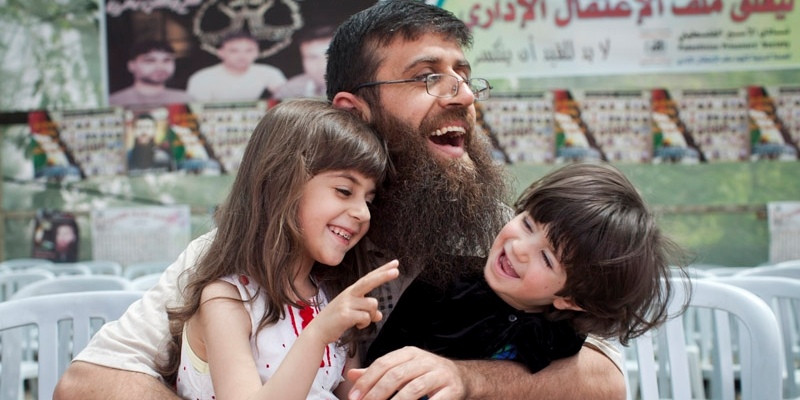
Although the hunger strike of Khader Adnan began on December 18, 2011, his act of protest and the subsequent “War of Empty Stomachs” was a defining aspect of 2012. After being arrested in the middle of the night before his family, Adnan was beaten, humiliated and held without charge or trial under administrative detention, a widely used practice by the Israeli occupation that requires no charge or public evidence to detain someone for months or even years.
Adnan challenged the Israeli system from the weakest place imaginable – a jail cell. He did it with his body and his willpower, and he won. Although the practice of administrative detention was not ended, it was challenged and weakened, and global awareness was raised. Alone, Adnan took action, and in the process inspired thousands of other prisoners to do the same. While the Palestinian Authority ignored his plight as long as it could, Israel was forced to respond. This highlighted the inefficacy of the PA to improve Palestinian lives, its close relations with Israel and its inability in the current Oslo framework to challenge its occupier.
Khader Adnan is my person of the year not because of his politics or the religious underpinnings of his message, but rather his unbending courage in the face of tyranny and of a larger trend among Palestinians and their supporters that must be encouraged. The hunger striker movement is part of a larger impulse growing in the occupied territories and beyond. This impulse is what has given rise to the BDS movement and other initiatives that aim to put agency back in the hands of the people.
It was the same impulse that led Palestinians to take control of the PLO and wrest decision-making away from the Arab states in the 1960s. It was the same impulse that moved Palestinians in the West Bank and Gaza Strip to rise up against the Israeli occupation in the late 1980s, and challenge from within instead of waiting for the PLO. And now it is the same impulse that is moving away from the Palestinian Authority, onto grassroots organizing. It says: we can no longer rely on the powers that be to solve our problems. We must take action into our own hands and put pressure on our governments – or let them be removed altogether.
— Omar Rahman
Avigdor Lieberman, foreign minister and Yisrael Beiteinu chairman
2012 wasn’t short on political tremors and surprises, but one of its most significant events was the affirmation of a long-known trajectory: the path of Avigdor Lieberman to becoming Israel’s prime minister. Lieberman is seen by foreign observers as crude, brutish and volatile – which are all true. But focusing on his more notorious and provocative outbursts detract from tracing the relentless determination with which Yisrael Beitenu has pressed his path to power, from leading a second-rank, sectorial party of immigrants, to pushing his way into the Israeli mainstream, to coming within a step of the premiership.
The merger of the Likud and Yisrael Beitenu into the heavy-set, clumsy Likud Beitenu with Lieberman as deputy leader may defer a direct challenge over leadership from Lieberman to Netanyahu; it makes Lieberman responsible for any move Netanyahu makes, rendering him unable to capitalize when the latter irritates the right wing, as with the deeply unpopular ceasefire agreement. But it grants Lieberman greater legitimacy than ever before – a quality he was quick to cement by purging his ranks of all the populists that helped mark him as a right-wing alternative to Netanyahu when he could still benefit from it. One of those purged, deputy foreign minister Danny Ayalon, is now reportedly seeking revenge by turning witness against his former patron, possibly prolonging the latter’s sojourn from power; but the sojourn is likely to be brief, and so far appears to be little more than a bump on the road for Netanyahu’s new heir apparent.
— Dimi Reider
The asylum seeker in Israel
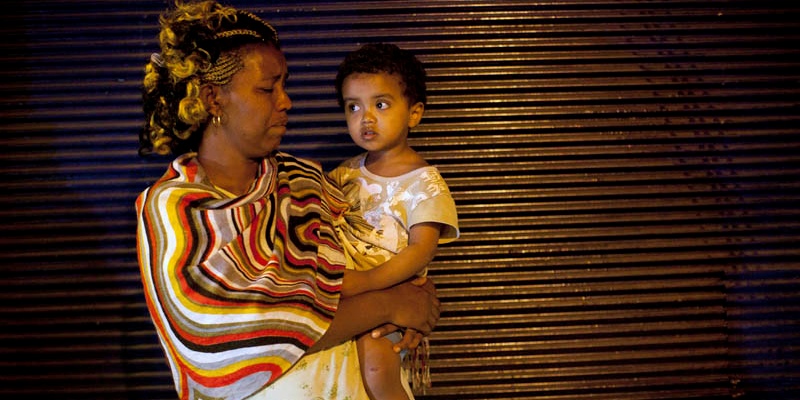
Road 211 is one of the loneliest in Israel. It serves some army bases, a small kibbutz, and a tiny settlement called Ezuz. A few kilometers before the Egyptian border, an abandoned gas station marks the turn to the Ketziot military prisons and detention facilities. At the peek of the Second Intifada, Ketziot held a couple of thousand Palestinian prisoners. Most of them were released or transferred in the last five years, and Ketziot, which has grown considerably, became the permanent home of a new population: African asylum seekers.
Escaping by foot from war-torn Sudan or the dictatorship in Eritrea, asylum seekers were at first greeted warmly by many Israelis. But their numbers grew, and the government failed to come up with a policy to regularize their status while complying with Israel’s international commitments. Instead, the refugees were sent to the poorest neighborhoods and towns in Israel, where populist politicians fanned the flames of racial tensions and blamed the Africans for spreading disease and crime. Attacks on asylum seekers became common – a kindergarten in Tel Aviv was torched, a flat was burned in Jerusalem. Following a right-wing rally, riots broke in one neighborhood, and a mob smashed windows of businesses frequented by asylum seekers and attacked immigrant passers-by.
At the height of the campaign against the Africans, the Knesset passed one of the most draconian measures against asylum seekers known to the West: according to the Prevention of Infiltration Law, anyone crossing the Israeli border illegally will be imprisoned for at least 3 years, without trial, without charges, without much chance of release.
As a result, several thousand asylum seekers are kept behind the concrete walls of Ketziot, among them women, children and babies. A few miles to the east, a newly constructed fence and IDF soldiers keep out those refugees who make it to the border. On the Egyptian side, Bedouin smugglers kidnap and torture asylum seekers for ransom. On the Israeli side – should they miraculously get past the fence and the soldiers – the prison desert of Ketsiot.
The asylum seeker simply has nowhere to go.
— Noam Sheizaf
The resident of the unrecognized village of Al Arakib
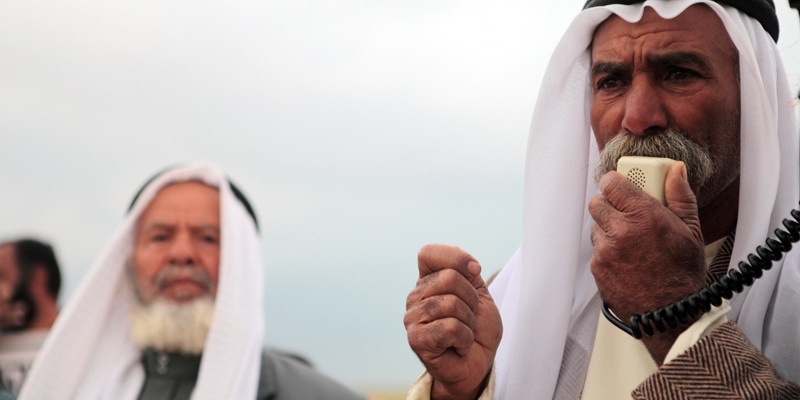
Earlier this month, the Bedouin village of Al Arakib was demolished for the 42nd time. The residents, who are citizens of Israel, are the embodiment of steadfastness, patience, and unwavering belief in their human and civil rights. That the state continues to destroy their village in the Negev desert reveals the deep contradiction between a “Jewish state” and a democratic state that treats all of its citizens equally.
The demolitions began in July 2010 despite the fact that Al Arakib’s fate was still being decided in court. Villagers hold deeds to the land from the Ottoman era and say that the Israeli army asked them to leave the area, temporarily, in 1951. The state then declared the land abandoned and appropriated it.
Now, Israel is attempting to Judaize the Negev, continuing the process that began during the 1947-1948 Nakba. The first step is the forced transfer of tens of thousands of Bedouin. Some consider Al Arakib a test case—a place where the state is flexing its muscles and seeing how much residents will resist.
My colleague Jillian Kestler-D’Amours was present during the most recent demolition. She said that the women of Al Arakib stood with video cameras, taping everything the media can’t be bothered to record. And then the villagers would put their tents back up—ready for the state to tear them down again.
— Mya Guarnieri
Daphni Leef, J14 leader and symbol
Daphni Leef is, of course, a symbol. Just one year ago, she was a symbol of J14, the movement that sought to change the discourse and priorities of Israeli society, and to start building something new, of the people and for the people. A year later, many feel that this dream has died, and that nothing is left of the cry for social justice except for a couple of former J14 leaders who found their way into mainstream Zionist parties. But in 2012, Leef continued to symbolize the wonderful spirit that has survived from the summer of 2011. It is no coincidence that it was her violent arrest that sparked the renewal of demonstrations this year, and it is also not sheer luck that Leef found herself on the right side, that of solidarity and anti-militarism, in the split within the movement.
Earlier this month, Leef gave up on half a million shekels offered to her for her participation in a commercial for a big shopping mall. Leef said she would settle for NIS 300, but would ask that the mall start treating its workers better – by giving them, among other things, social benefits – a deal the company rejected (Hebrew). But beyond just her own actions, Leef signifies the change that is indeed happening in Israeli society, with more and more people joining labor unions, setting up cooperatives, and taking on local struggles for change.
— Haggai Matar
Benny Gantz, IDF chief of staff
Something missing in the Israeli political atmosphere? There is – the fear of an imminent attack on Iran, which dogged the country since late 2011, and which came to a head in the summer with the expectation that Netanyahu and Barak would exploit the U.S. presidential campaign to strike sometime before election day on November 6.
Why didn’t it happen? Mainly because the Israeli military-intelligence establishment, which had been saying all along that the Air Force couldn’t do enough damage to Iran’s nuclear facilities to make the military and political blowback worth the while, held strong. And the individual who provided the leadership for that stand was IDF Chief of Staff Benny Gantz.
The opposition from the top brass meant Bibi and Barak were planning to launch a war that was opposed not only by the United States and the rest of the world, but by the leaders of the forces whose job it would be to carry it out. This was simply untenable, and first Barak gave up the idea, then Bibi. It was an extraordinary showing by the warrior class, but it needed a leader to succeed, and Gantz was that leader. He prevented a terrible disaster, which I believe was the most important thing any Israeli or Palestinian did this year.
— Larry Derfner
The Syrian civilian
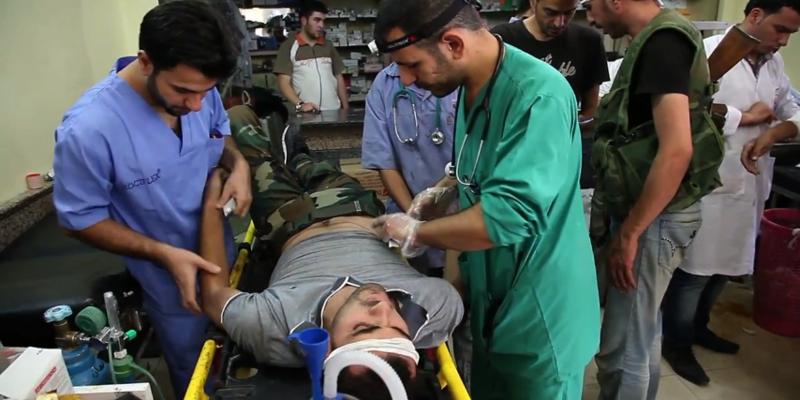
The Syrian civilian has suffered for decades from an oppressive and dictatorial regime – hopes for change and reform when young Bashar al-Assad took office diminished quickly. But this year, both the suffering and the heroism of the Syrian civilian reached new heights. Tens of thousands have been killed. Cities and villages have been destroyed and hundreds of thousands have become refugees. The world has forsaken the Syrians and instead has helped turn Syria into a site of conflict between world powers, with Russia, China and Iran on one side, and the West, led by the United States, on the other.
Yet the Syrians have shown an immense desire for freedom and dignity. The Syrian civilians have not remained silent. Many have stood up against oppression, risking their lives for what they believe. Some through writing, like Samar Yazbek an Alawite who didn’t let sectarianism blind her, and like Hind Kabawat, a human rights lawyer and activist devoting her time to aiding Syrian refugees. I work with Syrian activists on daily basis, and their courage, hope and persistence are inspirational. While they may be absent from the consciousness of the world, they remain my heroes of the year.
— Aziz Abu Sarah
God
God wins in 2012 in Israel, Israeli-Palestinian politics and maybe in Palestine too. True, God is not supposed to be controlling the political life of modern liberal democracies, in fact, that’s largely why the latter was invented. But in 2012 in Israel, the commitment of the ultra-Orthodox to the status quo of avoiding army service in favor of Torah study, brought down the government in May. A potential agreement on this issue between two secular parties, Likud and Kadima, headed off elections; until the grand coalition fell – over the inability to resolve the same issue.
Now there are no surprises expected in the basic left-right division the new elections will yield. Left and right, in turn, can be traced more consistently than any other characteristic to the religiosity of the voter. The more observant, the more right-leaning; this has always been the case. Since the religious and ultra-Orthodox have more children than seculars, their vote share is growing. Right-wing leadership for the foreseeable future will leave its indelible mark on policy regarding the conflict. Among the Palestinians, in turn, while not exactly a mirror image, there is a strong potential for resurgence of Hamas. The perception of victory and the emotional visit of Khaled Mashal bodes well for God among them too.
It’s not clear if the founders and sages of our respective religions had these specific manifestations of “God,” in mind. As such, it may not really be God who controls politics, so much as politics has made hash out of God.
— Dahlia Scheindlin
Read Also:
+972 Magazine’s Person of the Year 2012: The Settler
+972 Magazine’s Person of the Year 2011: Woman activist of the Arab world
+972 Magazine’s People of the Year 2011: Bloggers’ picks
+972 Magazine’s Person of the Year 2010: Abdullah Abu Rahmah
+972 People of the Year 2010: Bloggers’ picks

